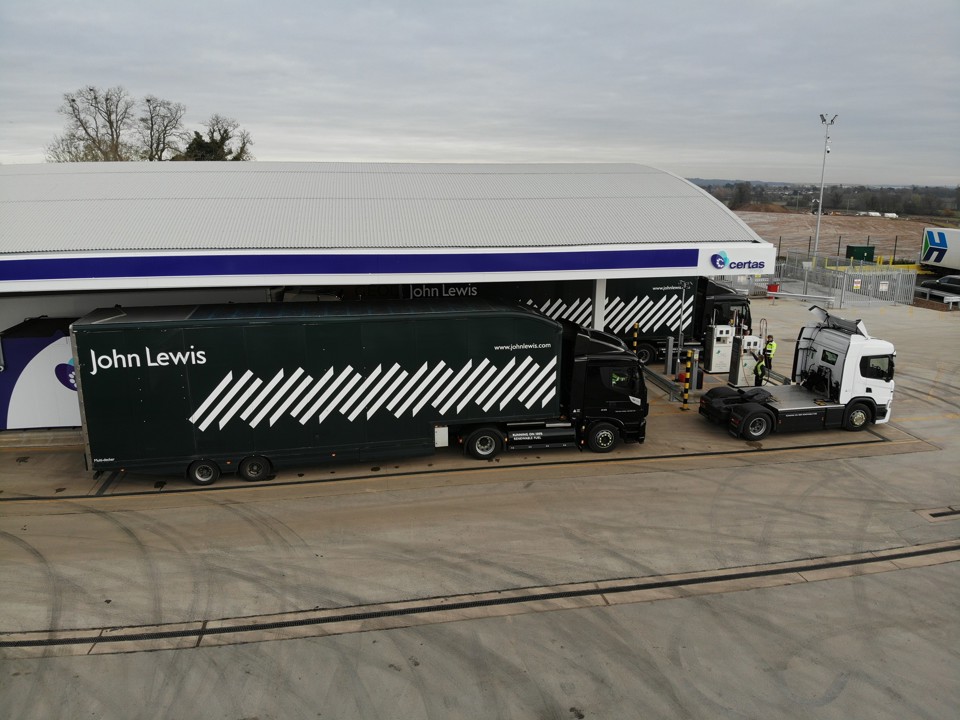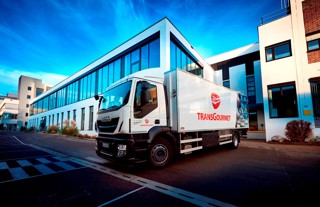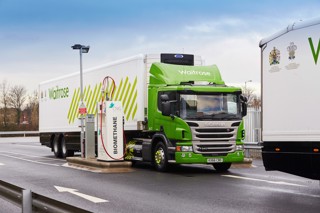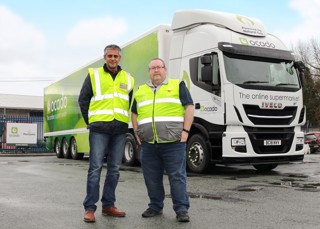Demand for renewable biomethane compressed natural gas (Bio-CNG) has risen by 800% since 2017 and is set to more than double this year.
The figures from CNG Fuels comes as it opens two new refuelling stations, with the support of Ingenious.
The new stations in Warrington – Europe’s biggest – and Northampton are capable of refuelling more than 1,000 HGVs a day, more than doubling the 600-a-day capacity of its existing stations at Leyland, Lancashire and Crewe, Cheshire.
The company is also planning to open an additional six to eight stations over the next 12 months as it expands its strategic network of HGV refuelling stations in line with burgeoning demand.
CNG Fuels has helped haulers save 55,000 tonnes of CO2 since it began supplying renewable and sustainable Bio-CNG in 2017. That’s expected to rise to 90,000 tonnes by the end of 2020 as demand increases by more than double, thanks to major brands such as John Lewis Partnership, Parcel company Hermes, and Home Bargains committing to switching from diesel.
It says that 100% of the fuel it supplies is renewable and sustainable biomethane approved under the Department for Transport’s Renewable Transport Fuel Obligation (RTFO) scheme.
The gas is currently sourced from waste feedstocks, such as food waste, helping to cut vehicle greenhouse gas (GHG) emissions by up to 85% and is 35%-40% cheaper than diesel.
The company is now securing supplies of biomethane from manure to create a fuel that will be net zero emissions on a well-to-wheel basis.
It expects to begin offering carbon neutral biomethane across all sites from next year at the same price as the renewable biomethane fuel it currently supplies.
HGVs account for 4.2% of UK carbon emissions, so decarbonising the sector is essential to meet the UK’s goal of achieving Net Zero by 2050.
Philip Fjeld, CEO of CNG Fuels, said: “We’re at a tipping point. Fleet operators are waking up to the urgency and scale of decarbonisation necessary for net-zero emissions by 2050 and we’re seeing demand for our fuel increase rapidly as a result.
“Our customers ordered hundreds of new biomethane fuelled trucks in 2019 and that trend is only set to accelerate over the next decade.
“We’re making the transition to carbon neutrality easier for fleet operators by developing a nationwide network of public access biomethane stations on major trucking routes and at key logistics hubs.”
The station in Warrington is located at Omega South on the M62, catering to several major hauliers based in the area. It can refuel up to 800 HGVs daily and serve 12 vehicles simultaneously.
The Northampton station is situated at the Red Lion Truckstop off the M1 and can refuel more than 350 HGVs a day.
The site is also part of the UK’s first large-scale study of how renewable and sustainable biomethane can help slash road transport emissions, supported by the Office for Low Emissions Vehicles (OLEV) in partnership with Innovate UK.
The John Lewis Partnership has already committed to phasing out all diesel-powered heavy trucks from its fleet and replacing them with over 500 new state-of-the-art Waitrose & Partners and John Lewis & Partners vehicles running on biomethane by 2028.
Parcel company Hermes is also replacing its 200-strong fleet of diesel trucks, using Warrington one of its largest distribution hubs as a springboard. Other major customers adopting biomethane include Home Bargains, ASDA, Argos, Royal Mail, DHL and Cadent.
Mervyn McIntyre, head of network fleet and vehicle compliance at Hermes Parcelnet, said: “We’re proud of our move towards a more sustainable future as the first parcel carrier to invest in bio fuels for our first-mile fleet. This will ultimately benefit people across the UK as we all look to reduce our carbon footprint.
“We’re delighted in the choice of Warrington as a location for a refuelling station, which will improve the efficiency of our network and allow us to run additional routes using bio methane fuelled vehicles.”
Element Energy forecasts the number of HGVs and buses running on natural gas to increase six-fold to 60,000 by 2030.
In response, CNG Fuels is opening new sites across the UK including in Erdington near Birmingham, Knowsley near Liverpool, and Larkhall, Newark and Euro Central in Scotland.
By 2021, a high proportion of UK HGV traffic will pass by a CNG Fuels refuelling station, giving fleet operators unfettered access to carbon neutral fuel. Bio-CNG will be fed directly to a number of these stations through gas pipelines managed by gas network, Cadent.
The Warrington and Northampton stations, as well as the Erdington CNG station under construction, have been supported by fund manager, Ingenious.
CNG Fuels is also consulting on how its network of refuelling stations can best accommodate low-carbon hydrogen and battery electric technologies for HGVs, so that it can support customers when these become commercially viable.























Login to comment
Comments
No comments have been made yet.